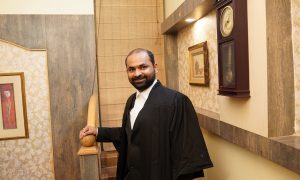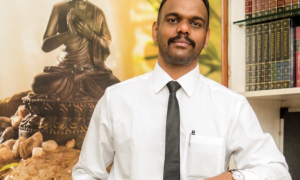Akshata Namjoshi is one of the most diligent and illustrious scholars of the 2014 batch of NLIU, Bhopal. She has participated in various co-curricular activities and has multiple publications to her name. Her interest in Corporate and Financial Laws led her to choose NUS for Masters right after graduation.
In this interview, Akshata talks about:
- Writing for journals and publications
- Importance of co-curricular activities
- Choosing NUS over King’s College, London for Masters
- Key ingredients for SoP
Most of our readers are law students and young lawyers. How will you introduce yourself to them?
I finished BA.LLB(Hons) from NLIU, Bhopal in 2014. I am currently pursuing LL.M in Corporate and Financial Services Law from NUS, Singapore.
What motivated you to choose law as a career? Did your family and friends suggest you to take up alternate career options like Medicine or Engineering?
Definitely, after cricket, engineering is the second biggest religion in India. Widely “professed” and “preached”. I started off as a science student, but soon I realised that engineering was definitely not the career of my choice. I decided to revert back to my childhood dream of becoming a lawyer.
How would you describe your five years of law school? Please share some of the memorable experiences of your college life. What made your college life exciting?
The best part about law school is that you can choose what you want to be, what kind of people you want to interact with, which activities interest you or whether you absolutely want to be a couch potato, which of course brings its own challenges.
For me little additions to my CV here and there made law school exciting. Debating and Mooting occupied my time in my 2nd and 3rd year and publications and blogging in 4th and 5th year.
Your internships at law school have all been with top tier. How did these experiences help mould you a lawyer and which was more useful for the LL.M applications?
It is very important to decide the kind of job or life you are looking for. Also, area specific internships in your 3rd year and 4th year help. For instance you can’t expect somebody to accept your LL.M application for Corp and Finance if all your internships have been in IPR. As far as top tier is concerned, I got a chance to intern with few of the best law firms in the country, but definitely, the kind of work that you do is the most useful.
You have multiple publications in various renowned journals. How should one go about writing papers and getting the same published?
I was lucky to have 4 publications and 3 paper presentations by the end of 5 years. While writing a paper it is essential to identify your core arguments and one should come to the point immediately, because honestly nobody has time to read a 2+ pages long introduction. Also, “Footnoting is not researching”. Your contribution to the topic, your arguments and analysis matters the most. That has worked for me at least. I am currently serving as the sub-editor of MightyLaws.in and I have been associated with A38 in the past.
I think students who wish to apply for LL.M applications should start with smaller journals and those which respond quickly (like Monthly or Quarterly Journals). At a later stage one can try and aim for bigger and renowned journals. If you select extremely narrow and restricted topics, the possibility of your paper getting published increases.
When and how did you decide to pursue Masters? Which universities did you select for your LL.M?
I always wanted to pursue masters. And at some point in the future I plan to do a Ph.D also. I decided to apply to the top few colleges in USA, UK and Singapore. Majorly because I wanted to specialise in Corporate Law and these were the best options available.
What prompted you to choose National University of Singapore from the plethora of options available? What was the application procedure?
I had an offer from King’s College, London, Queen Mary University, London, UC Berkley California and NUS, Singapore. During my research I realised that NUS curriculum is very rigorous and being a global financial hub it would give me a better insight.
The application procedure was definitely irritating. Every college requires a different set of documents. Many colleges require sealed envelopes, registrar’s signature, director’s bona-fide letter etc. One must start with all of this early. Otherwise you have to run a lot.
Also, most of the colleges expect your professors to send a Letter of Recommendation directly to them. In that situation one must not run after the designation of a professor. It is better to choose professors according to the subjects that they have taught and somebody you can bother every now and then. Also, be prepared to write a draft LOR all by yourself because most professors expect you to do that.
How should one go about choosing a university? Which subject you are studying there? Why did you decide to take this particular subject?
I am pursuing my LL.M in Corporate and Financial Services Law. I went through the modules and exam pattern before deciding on NUS. I would recommend that anybody who wishes to pursue LL.M should speak to Ex-students from that university, even if they are complete strangers. I spoke to numerous ex students from NUS, King’s College, Queen Mary, NUS and UCB. Talking to them helped me understand what I was looking for. Like in this case I decided to chuck big names and went for the university which had an elaborate and exhaustive curriculum.
How diversified is your batch at National University of Singapore? Do you have any Indians in your batch?
Our batch is small, with just 25-30 people. I was happy to see large number of Europeans in NUS though. And yes there are Indians in my batch. Accommodation definitely was a problem. College rarely provides you with a hostel. They recommend few hostels and you have to apply individually or you can also rent a flat.
How does one go about scholarships? Does the Institute offer any scholarship? Do students have part time opportunities? Highlight some of it.
NUS considers students for scholarships automatically. But other colleges in UK and USA ask for applications. There are partial and full waivers. There are many scholarships which come up every year. Some even bear the costs of living.
Students can work part time for maximum 16 hours a week in Singapore. In UK it is 20 hours.
As far as part time opportunities are concerned there are plethora of options. Petrol Pumps to Law Firms, everything is open. I am currently working as a research assistant to a professor in NUS itself. It is the most favoured part time job for many students since it is not too time consuming. One must however remember that LL.M courses in itself require a full-time dedication.
Do you think that nowadays, some students do an LL.M because it seems the “right thing to do” and not because they know what they want to study or why they want to?
The truth is that nobody studies properly for 5 years. Once you start with a job you look for a change or revival in your career. If one is thinking of doing an LL.M just because, one didn’t get a job, then that person is in for a hard time. LL.M courses are quite demanding and if one is not interested in the subject that they have chosen, it would be quite counter-productive. You should pursue LL.M absolutely because you get to study a subject of your choice. It helps in understanding your subject through and through which aids in the long run.
Here in NUS, I hardly remember being bombarded with cases. The professors have taught concepts and concepts only.
What is the key ingredient of a well written SOP? Any tip to those making their SOPs?
It is essential to avoid clichés. Also, an SOP is not a self-appraisal which would be like saying that “I want to be a part of football team because I am good at football”. Everybody knows that. Talk about the specifics and why you think that you can be a part of the team. Simple as that. SOP should be channelled and short.
At the same time you shouldn’t underestimate yourself and you should include all the relevant details. Try looking for things in your CV which define you.
How do you expect this experience to influence your career?
In my case, I had a job offer from Trident before leaving college, but by then I had realised that I was still not prepared for a job. It is possible that you bag a job and then perform badly because of lack of knowledge. I wanted to learn more before I tender my services to the market. I expect this LL.M to prepare me fully for a job, at least in terms of strengthening my concepts. I hope that I would know the subject of my choice before I start working.
Lastly, what would be your parting message for our readers?
Keep trying. Try everything. Don’t be in a rush to take up a job, after 10 years everybody is going to be in the same position. Find out what you like and what you want to do and then work on it.
























